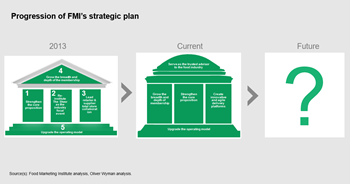By Leslie Sarasin, President and CEO, Food Marketing Institute

We all know that time is relative; that the hours spent awaiting medical test results drag by interminably, while time spent at play on holiday seems to just zip by faster than we can measure. While we’ve always known the registering of time to be fluid, it does appear to me that the present pace of life makes time feel like it’s moving at lightening flash speed. It’s as if we have universally exchanged the standard 60-second minute for the New York minute, which Johnny Carson once described as the length of time between when the traffic light turns green and the person in the car behind you starts to honk his horn.
The faster pace has many implications for all of us, but at least part of what it means is that the notion of the five to seven-year strategic plan has gone the way of the phonograph. We may miss it and the nostalgic among us may still use it, but it’s really no longer functional. Life, business and consumer expectations are moving so fast, who can even guess what our world will be like half a decade from now?
Today, the approach to planning includes words like nimble, adaptable, agile and flexible. Of course, the irony is that to make our organizations all those things, we must plan for it. And that is exactly what FMI is doing. With the help of partners at Oliver Wyman, we are again reflecting, soliciting member opinions, interviewing external stakeholders, scrutinizing the internal engagement data and asking the tough questions of ourselves in a strategic plan process that includes even revising the way we approach our strategic planning and implementation process. We seek to develop a plan that will ensure FMI can be responsive to the rapidly evolving needs of our members and that puts us on the trajectory to be the gold standard of association service and advocacy for our constituents.
As you might imagine, there are several forces at work that we must take into consideration in developing this plan. These include the substantial changes in food retail’s market dynamics, the changing association landscape and the need to address the challenges of a new economic environment. The feedback we’ve received to date supports FMI’s move to boldly and proactively adapt to the new emerging realities of the food and consumer products industry.
In a survey of FMI Board members, 80 percent of those participating stated they believe FMI consistently represents their interests. That said, 76 percent of Board members also believe FMI in the future should be quite different than the FMI of today. That puts us in the same place many of you find yourselves – needing to do better what you already do well, WHILE brashly preparing for a reality that has not yet fully materialized.
At FMI’s Board meeting in January – held in conjunction with the Midwinter Executive Conference in Miami – the Board will scrutinize the details of this strategic adventure. FMI Board Chairman Joe Sheridan will then share plan highlights from the Midwinter stage at the Annual Meeting on Monday, January 28, 2019. I hope to see you in Miami in January, but until then, if you have ideas, thoughts or opinions you’d like to share, I’d love to hear them. Industry Topics address your specific area of expertise with resources, reports, events and more.
Industry Topics address your specific area of expertise with resources, reports, events and more.
 Our Research covers consumer behavior and retail operation benchmarks so you can make informed business decisions.
Our Research covers consumer behavior and retail operation benchmarks so you can make informed business decisions.
 Events and Education including online and in-person help you advance your food retail career.
Events and Education including online and in-person help you advance your food retail career.
 Food Safety training, resources and guidance that help you create a company food safety culture.
Food Safety training, resources and guidance that help you create a company food safety culture.
 Government Affairs work — federal and state — on the latest food industry policy, regulatory and legislative issues.
Government Affairs work — federal and state — on the latest food industry policy, regulatory and legislative issues.
 Get Involved. From industry awards to newsletters and committees, these resources help you take advantage of your membership.
Get Involved. From industry awards to newsletters and committees, these resources help you take advantage of your membership.
 Best practices, guidance documents, infographics, signage and more for the food industry on the COVID-19 pandemic.
Best practices, guidance documents, infographics, signage and more for the food industry on the COVID-19 pandemic.
